This site is supported by our readers. We may earn a commission, at no cost to you, if you purchase through links.

If you’ve got a computerized model, expect to pay on the higher end. Simpler, mechanical ones are usually less expensive.
The location and reputation of the repair shop can also impact the price. A tune-up usually includes cleaning, lubricating, and adjusting key parts to keep your machine running smoothly.
Think of it as a check-up—small maintenance now can save you from costly repairs later. Curious about DIY tips or common issues? Keep reading!
Table Of Contents
Key Takeaways
- You’ll pay $75-$125 for a sewing machine tune-up in 2025, with higher costs for computerized models.
- Regular tune-ups prevent bigger repairs, improve stitch quality, and extend your machine’s lifespan.
- DIY maintenance can save you money, but professional servicing ensures thorough cleaning and precise adjustments.
- Factors like location, machine type, and repair shop reputation impact the cost of a tune-up.
Sewing Machine Tune Up
You’ll need a tune-up for your sewing machine every 12-24 months to prevent costly breakdowns and guarantee smooth, precise stitching.
A well-tuned sewing machine saves time, prevents breakdowns, and ensures your stitches always look professional and precise.
A professional service includes cleaning lint buildup, lubricating moving parts, adjusting tension settings, and checking electrical components, which will extend your machine’s lifespan and maintain stitch quality.
Importance of Regular Maintenance
Regular sewing machine maintenance isn’t just recommended—it’s vital to keep your trusty stitching companion running smoothly for years to come.
Prevent costly repairs and keep your stitches flawless with consistent sewing machine care—it’s the secret to long-lasting performance.
Think of it as preventive medicine for your machine.
Here’s why maintenance matters:
- Extends lifespan by preventing premature wear on moving parts
- Maintains smooth operation and consistent stitch quality
- Prevents unexpected breakdowns during important projects
- Maintains proper lubrication, preventing metal-on-metal friction damage to ensure smooth operation.
Average Tune Up Cost
Most sewing machine owners will pay between $75 and $100 for a standard tune-up, not including replacement parts.
If you’ve got a computerized embroidery machine, expect to shell out $100 or more for basic maintenance.
Sergers and cover stitch machines typically cost around $109 for full service, while vintage Singer 221 machines run about $90.
Regional pricing varies, so you’ll find different costs depending on your location.
Factors Affecting Tune Up Cost
While you’ve seen the average cost of a tune-up, several factors can make that number fluctuate for your specific situation.
Your final sewing machine tuneup price tag depends on multiple variables.
Here are 5 key factors affecting what you’ll pay:
- Machine Complexity – Computerized models cost more than mechanical ones
- Part Availability – Rare or discontinued parts increase costs
- Urgency – Rush service typically commands premium pricing
- Warranty Status – Coverage can reduce or eliminate costs
- Service Package – Basic vs. thorough tune-up options
Common Sewing Machine Problems
You’ll likely encounter issues like skipped stitches, thread bunching, or fabric feeding problems when your machine needs a tune-up.
These common problems often signal it’s time for professional servicing, which can prevent more expensive repairs down the road.
Skipped Stitches
Those frustrating skipped stitches are often the first sign your machine needs attention.
Check your needle condition first—bent or dull needles can’t form proper stitches.
Poor thread quality or incorrect bobbin issues might also be culprits.
Your presser foot pressure and timing adjustment could need professional calibration during a sewing machine tuneup.
A basic tune up cost of $75-$100 addresses these problems, making sewing machine maintenance worth every penny for consistent stitches.
Uneven Stitches
I’ll write content about "Uneven Stitches" for your article on sewing machine tune-up costs, following all your requirements.
While skipped stitches leave gaps in your work, uneven stitches create an inconsistent, wavy appearance that ruins your project’s professional look.
These jagged lines often indicate underlying issues that require attention during a tune-up:
- Improper tension adjustment causing thread imbalance between top and bobbin threads
- Worn or bent needle quality affecting stitch formation
- Incorrect presser foot pressure for your fabric type
A professional tune-up ($75-100) addresses these problems by recalibrating your machine’s stitch length and tension settings for superior sewing machine maintenance and improved stitch quality.
Broken Threads
After addressing uneven stitches, you’ll likely encounter broken threads – another common headache during sewing sessions.
When your thread keeps snapping, it’s usually telling you something’s wrong with your machine.
Here’s what typically causes thread breakage:
| Cause | Solution | Impact on Tuneup Cost | Prevention |
|---|---|---|---|
| Poor Thread Quality | Use high-quality threads | $0 (DIY fix) | Purchase better threads |
| Incorrect Needle Compatibility | Match needle to fabric thickness | $20-35 replacement | Check needle regularly |
| Improper Tension Settings | Adjust tension dial | Part of standard tuneup | Test on scrap fabric |
| Damaged Bobbin Issues | Replace worn bobbins | $5-15 per bobbin | Inspect thread path monthly |
Fabric Not Feeding
When your fabric stubbornly refuses to move through your sewing machine, five common culprits are likely responsible.
Check your feed dog height first—these tiny teeth might be too low to grip properly. Adjust your presser foot pressure based on fabric type effect; thicker materials need less pressure.
Verify your stitch length setting isn’t at zero, examine bobbin case issues, and make certain you’re not using an inappropriate foot.
Fixing fabric feeding issues often costs less than a full sewing machine tuneup.
Thread Bunching
Most sewers encounter thread bunching at some point — that unsightly nest of thread forming under your fabric.
This common issue often signals it’s time for a sewing machine tuneup, which typically costs $75-$100.
- Tension problems causing upper thread to pull too tight
- Bobbin issues from incorrect installation or winding
- Wrong needle type for your fabric weight
- Poor thread quality creating excessive lint
- Dirty feed dogs preventing smooth fabric movement
Cost Factors for Tune Up
You’ll find that several key factors affect how much you’ll pay for a sewing machine tune-up, including the type and age of your machine, its current condition, your location, and the repair shop you choose.
When budgeting for maintenance in 2025, remember that computerized models typically cost $20-50 more to service than mechanical ones, while vintage machines might require specialized expertise that comes with a higher price tag.
Type of Machine
Your sewing machine’s type substantially impacts tune-up costs in 2025.
Mechanical sewing machines typically cost $75-$100 for basic servicing, while computerized models start around $100 and can exceed $150.
Embroidery machines are even pricier, often starting at $100-$200, and industrial machine repairs can reach $5,000 with parts ranging from $16-$148.
Vintage machine servicing may cost more due to specialized knowledge requirements, and brand-specific pricing varies, with high-end brands like Bernina commanding premium service fees.
Age of Machine
How does the age of your sewing machine impact tune-up costs? Vintage machines (pre-1970s) often cost $100-150 to service due to specialized parts availability challenges.
Meanwhile, modern computerized models typically range from $75-100 for basic tune-ups.
Age-related wear affects machine lifespan substantially – older machines may require more extensive maintenance to address worn gears and dried lubrication, directly influencing your sewing machine maintenance cost.
Regular maintenance helps to reduce wear and tear to ensure your machine operates smoothly.
Condition of Machine
The condition of your machine substantially impacts your sewing machine tuneup cost. A well-maintained machine typically requires less intensive servicing than one in poor shape.
- Rust accumulation in metal components can add $25-50 to standard fees
- Excessive part wear often necessitates replacements, increasing costs by $30-100
- Poor motor health may require specialized electrical repairs ($75-150)
- Visible physical damage usually demands the most expensive fixes
Location
While a clean machine works better, where you live can markedly impact your repair bill.
Urban areas typically charge more than rural locations for sewing machine service due to higher overhead costs. Regional price differences can be substantial – you might pay $75 in a small town versus $120 in New York City.
Technician availability and local repair demand also affect pricing. Check multiple local sewing repair shops to find the best rates.
Repair Shop
Choosing the right sewing machine repair shop impacts your tune-up cost.
Look for these key factors:
- Shop Reputation: Trusted shops often guarantee quality work.
- Service Guarantees: A guarantee protects against redo expenses.
- Estimate Accuracy: Clear pricing prevents surprise fees.
- Turnaround Time: Quick repairs keep your projects on track.
Reliable shops simplify part sourcing and control overall sewing machine repair prices.
DIY Vs Professional Tune Up
Deciding between DIY and professional tune-ups comes down to cost, time, and expertise. While you can save money handling basic maintenance yourself, a professional guarantees thorough cleaning and precise adjustments.
Benefits of Professional Servicing
Professional servicing boosts your sewing machine’s lifespan and guarantees peak performance.
Expert diagnostics spot hidden issues that DIY fixes might miss, saving you from costly repairs later. Plus, warranty protection often requires professional tune-ups.
Complex repairs, like timing adjustments, are handled seamlessly, preventing damage. Ultimately, investing in professional care minimizes sewing machine maintenance cost over time by maintaining reliability and stitching precision.
| Benefit | Why It Matters |
|---|---|
| Expert Diagnostics | Catch hidden issues early |
| Warranty Protection | Keeps manufacturer coverage intact |
| Complex Repairs | Handles intricate fixes effectively |
| Prevents Damage | Avoids costly future breakdowns |
| Peak Performance | Maintains smooth and precise stitching |
DIY Cleaning and Maintenance
DIY sewing machine maintenance saves time and cash. Start with Dusting Methods—grab a small brush or canned air.
Master Bobbin Cleaning by removing lint buildup. Get comfy with Needle Replacement to avoid skipped stitches.
Use proper Oiling Techniques for smooth operation, applying sewing machine oil sparingly. Selecting the right type of oil is essential for peak performance.
Finally, practice efficient Thread Removal to keep everything tangle-free.
| Task | Tools Needed | Frequency | Difficulty Level | Estimated Time |
|---|---|---|---|---|
| Dusting Methods | Small brush, air | After each use | Easy | 5 minutes |
| Bobbin Cleaning | Tweezers, brush | Weekly | Moderate | 10 minutes |
| Needle Replacement | New needles | Monthly | Easy | 5 minutes |
| Oiling Techniques | Machine oil | Monthly | Moderate | 15 minutes |
| Thread Removal | Hands/scissors | As needed | Easy | 2 minutes |
Cost Comparison
Comparing DIY savings and professional costs reveals a clear difference.
DIY cleaning might cost nothing but your time, while professional tune-ups average $75-$100, excluding parts. Factors like machine type, local rates, and service packages influence the sewing machine tuneup cost.
Regular maintenance helps prevent costly repairs.
Use this table to decide:
| Factor | DIY Savings | Professional Cost | Additional Notes |
|---|---|---|---|
| Time Investment | High | Low | DIY requires effort/time. |
| Labor Costs | $0 | $50-$150 | Depends on repair shop. |
| Repair Estimates | N/A | Free | Varies by technician. |
| Tune-Up Quality | Moderate | Thorough | Pro guarantees longevity. |
This comparison highlights the difference in costs and benefits between DIY and professional services, allowing you to make an informed decision based on your needs and budget.
Repair Costs and Considerations
When you’re weighing repair costs, it’s important to take into account your machine’s type, complexity, and age, as these factors directly impact pricing.
Don’t forget that location and your repair technician’s expertise also play a big role in how much you’ll pay.
Machine Type and Complexity
The sewing machine tuneup cost depends on machine type and repair complexity.
Mechanical sewing machines are simpler, making maintenance cheaper. Computerized sewing machines and embroidery machine costs run higher due to technology.
Industrial machine repair or vintage machine servicing can be pricy because of specialized parts.
High-end maintenance often means precise care, but it’s worth the investment to avoid future headaches, and ensure the longevity of your sewing machine.
Location and Repairman’s Expertise
Your location impacts sewing machine repair prices substantially.
Urban areas often have higher rates due to living costs. A skilled repair technician might charge more, but their expertise reduces repeat issues.
Look for shops with a solid reputation offering service guarantees. Also, factor in travel costs if you’re far from the repair shop.
Compare local pricing wisely, considering the following factors:
- Higher costs in cities
- Skilled expertise reduces future repairs
- Reputable shops guarantee quality
- Travel costs add up, emphasizing the need for wise comparisons.
Extent of Damage or Needed Repairs
Hidden damage can sneakily raise your sewing machine repair cost.
Repair difficulty, like fixing a worn timing belt, and part scarcity also factor in. To weigh replacement vs. repair, consider the sewing machine maintenance cost against its age and value.
Hence, regular tune-ups improve stitch quality and extend machine life.
Here’s a breakdown:
| Issue | Repair Cost | Impact on Sewing Machine Repair Cost |
|---|---|---|
| Skipped Stitches | $50-$80 | Simple, but hidden wear may emerge. |
| Broken Parts | $75-$150 | Scarce parts increase expense. |
| Timing Adjustments | $80-$100 | Slight adjustments often justify the cost of repair. |
| Motor Replacement | $200-$300 | Complex but fixes functionality issues. |
| Full Overhaul | $300+ | Costs rise with repair complexity and part availability. |
Considering Relearning Curve With New Machine
When weighing the cost of repair versus replacement, don’t overlook the time and effort required to adapt to a new machine.
Feature differences can challenge your workflow, especially if you’re used to a specific brand.
Skill adaptation takes time, and project shifts may slow down.
Repair estimates often reveal that sewing machine maintenance costs save more than relearning everything, which can be a significant consideration in the decision-making process, and ultimately, save more.
Maintaining Your Sewing Machine
Keeping your sewing machine in good shape isn’t hard, but it does take a little effort.
With regular cleaning, lubrication, and timely tune-ups, you’ll keep it running smoothly and avoid costly repairs.
Regular Cleaning and Lubrication
Keeping your machine running smoothly starts with regular cleaning and lubrication. Dust and lint build up fast, so make it a habit.
Use proper lubricant types to avoid damage. Clean components like feed dogs and bobbin cases with care, and don’t skimp on sewing machine oiling. It’s simple, effective, and extends your machine’s life.
For peak performance, consider using specialized machine lubricants.
- Clean lint around the bobbin area
- Wipe exterior components
- Apply sewing machine oil sparingly
- Use a soft brush for hard-to-reach spots
- Avoid over-lubricating parts
Regular maintenance is key to a long-lasting and smoothly running machine.
Checking and Replacing Parts
If your needle is dull, replace it—it’s like trying to carve wood with a butter knife!
Routine bobbin inspection, feed dog condition checks, gear wear assessments, and belt integrity reviews keep your sewing machine humming along.
A vital step in maintaining your machine involves oiling moving parts to guarantee smooth operation. Here’s a quick guide:
| Part | Repair or Replace? | Typical Cost ($) |
|---|---|---|
| Needle | Replace | 2–10 |
| Bobbin | Inspect, Replace | 3–12 |
| Belt | Replace | 20–50 |
Ignoring worn sewing machine parts hikes the repair cost!
Scheduling Professional Servicing
Professional sewing machine servicing keeps it running like clockwork.
Aim for yearly service frequency, or stretch to two years with regular at-home care.
Find technicians by comparing estimates and checking reviews—this guarantees trustworthy work.
Ask about service contracts or warranty impact to avoid surprises.
Scheduling routine sewing machine maintenance saves on the cost of repair later.
Troubleshooting Common Issues
Scheduling regular professional servicing prevents headaches, but knowing how to troubleshoot common sewing machine problems can save time.
- Needle Problems: Replace dull or bent needles to avoid skipped stitches.
- Tension Adjustment: Check thread tension if stitches are uneven or thread breaks.
- Feed Dog Issues: Clean them if fabric isn’t moving properly.
Selecting the right needle impacts stitch quality.
DIY sewing machine maintenance reduces repair headaches.
Frequently Asked Questions (FAQs)
How much does a sewing machine tune-up cost?
Think of a sewing machine tune-up as an annual spa day for your machine—it typically costs $75 to $100, depending on your machine type, location, and shop.
Computerized models may cost slightly more.
How much does a sewing machine repair cost?
Sewing machine repair costs vary widely, typically ranging from $50 to $150, depending on the issue, complexity, and machine type.
Higher-end models or specialized repairs like timing adjustments may cost more.
Get multiple quotes.
How much does a tune-up cost?
Picture your sewing machine like a trusty car—it needs care to stay in gear.
A tune-up costs $75-$100, sometimes $100+ for computerized models, ensuring smooth stitching and extending the machine’s lifespan.
How much does it cost to repair a Singer sewing machine?
Repairing a Singer sewing machine typically costs $85 to $90 for basic fixes, but prices can climb depending on the issue. Complex repairs on computerized models might run $100 or more, excluding parts.
How much does it cost to repair a Bernina Sewing Machine?
Fixing a Bernina sewing machine can feel pricey—repairs usually range from $150 to $500, depending on complexity.
Vintage or detailed work might cost more, but investing in its upkeep guarantees years of smooth sewing ahead.
How much does a sewing machine repair school cost?
Sewing machine repair school costs vary widely, ranging from $500 to $3,000 or more, depending on the program’s length, depth, and location.
Online courses are typically more affordable but may offer less hands-on training.
What is the cost of testing stitch quality?
Testing stitch quality is like giving your sewing machine a checkup—it’s often included in routine tune-ups, costing $75 to $
Standalone stitch checks may vary but are generally affordable, ensuring smooth and consistent results.
How much does tension calibration typically cost?
Tension calibration typically costs between $50 and $120, depending on your machine type and location.
Since improper tension can ruin stitches, it’s worth investing in professional help if adjustments feel beyond your expertise.
Are tune-ups required for vintage machines?
Vintage sewing machines need tune-ups to keep their charm and functionality.
Without regular care, such as cleaning, oiling, and timing checks, parts can wear out, affecting performance.
Treat it like maintaining a classic car—worth the effort to preserve its functionality!
Do tune-up costs include oiling moving parts?
An ounce of prevention is worth a pound of cure.
Tune-up costs generally include oiling moving parts as part of regular maintenance, ensuring smoother operation, reduced wear, and a longer lifespan for your sewing machine.
Conclusion
Imagine your sewing machine purring smoothly, ready to tackle any project.
Regular tune-ups are the secret to keeping that performance sharp. A typical sewing machine tune-up cost ranges from $75 to $125 in 2025, influenced by factors like machine type, age, and location.
Skipping this maintenance risks bigger repair bills down the road, so it’s worth the investment. Whether you’re DIY-savvy or prefer professional care, staying proactive guarantees your machine lasts longer and sews with precision.

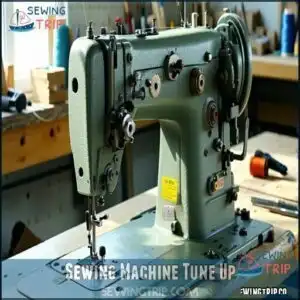
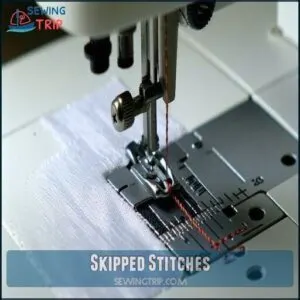
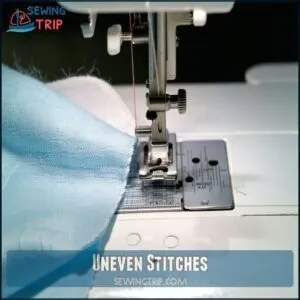
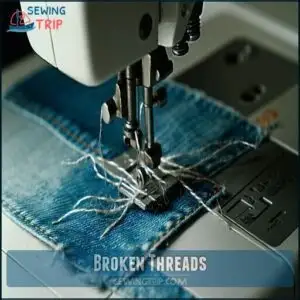
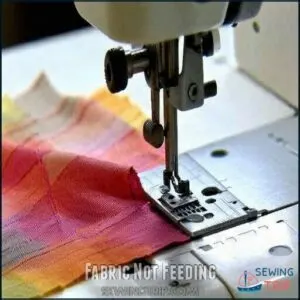
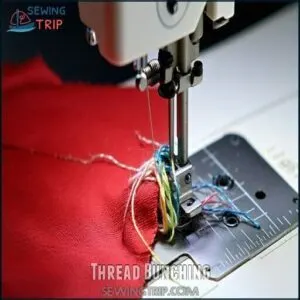
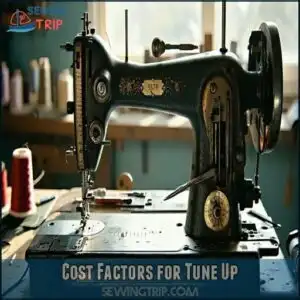
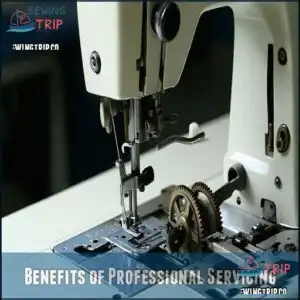


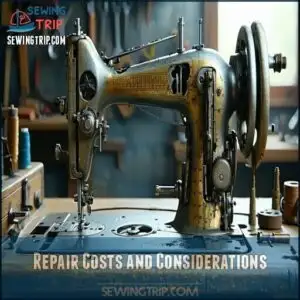
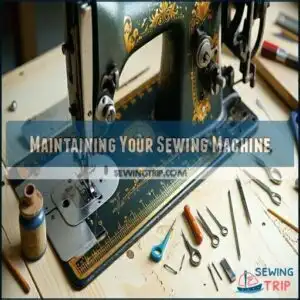
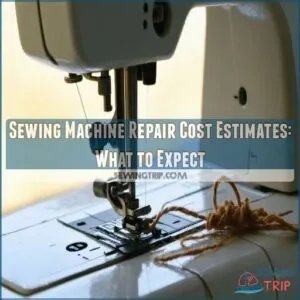
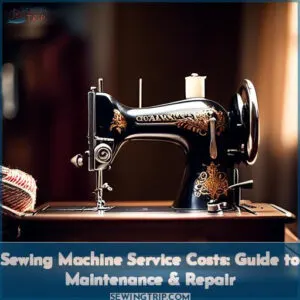

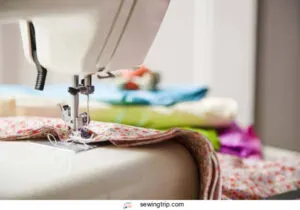

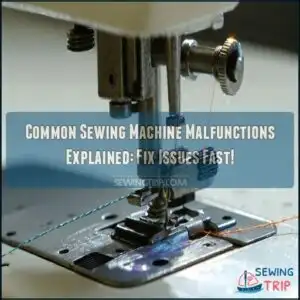
Linda
May 27, 2025 at 12:49 AM
How can you get printed directions and parts information for a Joanne Fabrics sewing machine bought for a $100.00 at the Pgh. McKnight Road Store.